What is the meaning of "a device which does not exist was specified"? Why and when it happens? It's an error that prevents you from opening your devices, and there is a problem for several reasons when you want to access your connected devices such as SSD, hard drive, external hard drive, USB flash drive, memory card, etc.
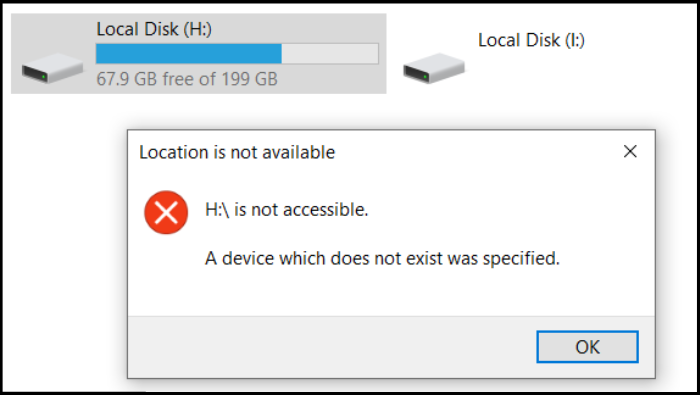
Don't worry if you're facing that type of error. You'll find several solutions after thoroughly reading this how-to guide tutorial article. We'll discuss different reasons for this error (a device which does not exist was specified) and enable you through various methods with the complete step-by-step guide so that you can solve this problem on your own very easily and quickly.
What Caused the "A Device Which Does Not Exist Was Specified" Error
There are many reasons you see an error like that (a device which does not exist was specified). It could be a connectivity issue, permission issue, or corruption of the drivers. We specified a few common causes that prevent you from opening your connected devices and show the"a device which does not exist was specified" error:
- Improper connection
- Lack of permissions to access the drive
- Mismatching drive letter
- Outdated motherboard drivers
- Bad sectors of hard disks
- Issues with the hard disk
- Inaccessible drive
- Faulty motherboard header
- Defective USB ports
And several other reasons but above discussed reasons are prevalent for that error. Now the question is how to resolve this issue smoothly. If you want to check if the problem is with your hard drive first, we have a dedicated article that provides a quick solution to check and repair hard drive health:
How to Check Hard Drive Health in Windows [Six Working Solutions]
It's crucial that you maintain a close eye on hard drive health in Windows 11 and Windows 10 to prevent any unforeseen crashes and the subsequent data loss they would cause.
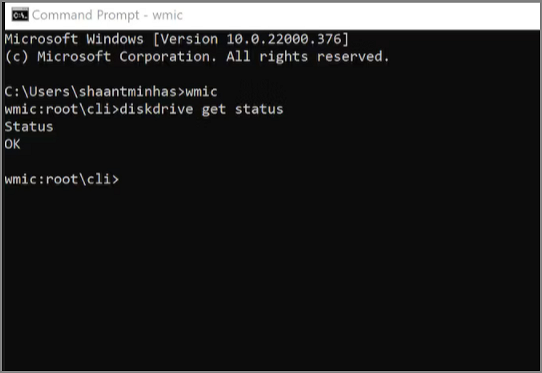
If it's caued by other reasons, read on. In this regard, we listed seven different ways to fix this error quickly on your own. Apply any solution accordingly, and that error will be fixed, and you'll get rid of the"a device which does not exist was specified" error.
How to Fix a Device Which Does Not Exist Was Specified
There are multiple methods to fix the"a device which does not exist was specified" error.
- Fix 1. Uninstall and Reconnect the Drive
- Fix 2. Gain Permissions to Access the Drive
- Fix 3. Change the Drive Letter
- Fix 4. Update the Motherboard Drivers
- Fix 5. Check and Fix Bad Sectors
- Fix 6. Recreate the Partition
- Fix 7. Change the Motherboard Headers
We'll go through seven different ways and techniques, and you have to choose any method accordingly.
Fix 1. Uninstall and Reconnect the Drive
Uninstall and reconnect the drive by following a few simple steps:
Step 1. Search "Device Manager" in the search box of the taskbar. Once it appears, click on it to open it.
Step 2. On the "Disk drives," click equal to sign (>) to expand it, right-click on "Disk driver," click "Uninstall" from the drop-down menu, and again click "Uninstall" in the pop-up.
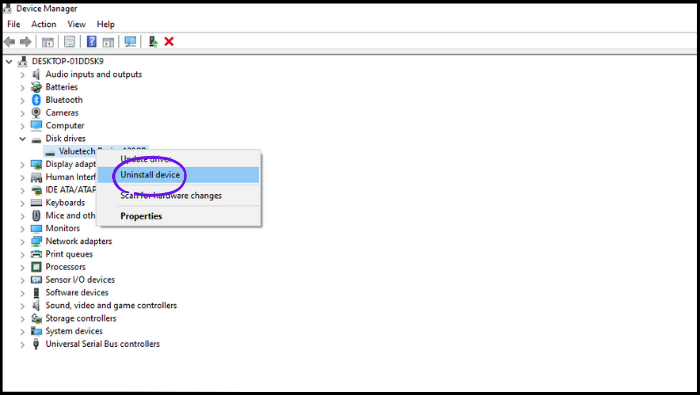
Step 3. Turn off your PC, remove or open the CPU case, disconnect the hard drive and reconnect.
After completing the operation restart your PC and check if it's working and the issue has been fixed.
Fix 2. Gain Permissions to Access the Drive
Declined or insufficient permissions on the hard drive could cause this error. Fix it with the Windows built-in tool: File Explorer. Follow the below-detailed steps:
Step 1. Go to "File Explorer" and right-click on the hard drive that shows the error. Next, click on "Properties" from the drop-down menu, navigate to the "Security" tab and click "Edit."
Step 2. Under the "Permissions For Authenticated Users" section, check mark on "Full Control" under the "Allow" option, click "Apply," and then click "OK."
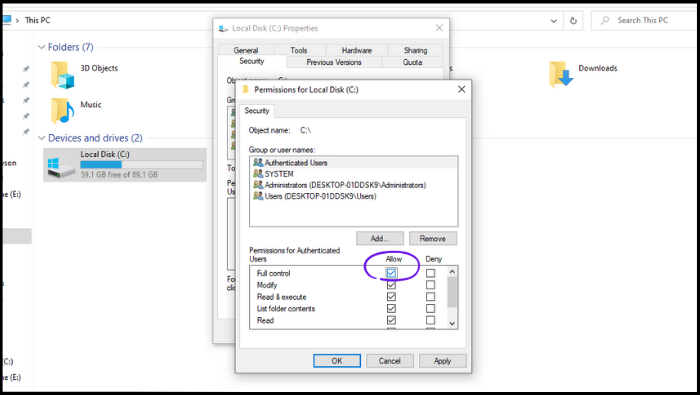
After completing the above operation, open that hard drive and see if the error is fixed.
Fix 3. Change the Drive Letter
Changing the drive letter can fix your issue of "a device which does not exist was specified." Instead of going through a lengthy process, EaseUS Partition Master can do it quickly. This is an easy solution to perform quickly.
Follow the process to resolve the issue.
Step 1. Run EaseUS Partition Master, right-click the target partition, and choose "Change Drive Letter".
Step 2. In the new window, click the down arrow and choose a drive letter for the partition from the drop-down menu, then click "OK".
Step 3. Click the "Execute 1 Task(s)" button in the top-left corner, check the changes, and click "Apply" to change the drive letter of the selected partition.
Fix 4. Update the Motherboard Drivers
Update the motherboard drivers to fix the"a device which does not exist was specified" error. In this regard, the EaseUS DriverHandy is the best solution because sometimes we don't know which drivers are outdated and incompatible, but EaseUS DriverHandy can scan thoroughly outdated and incompatible drivers and fixes them automatically.
Follow the detailed steps:
Step 1. Download EaseUS DriverHandy and open it.
Step 2. Click "Scan" to find all outdated drivers.
Step 3. Choose the outdated Motherboard drivers and click "Update."
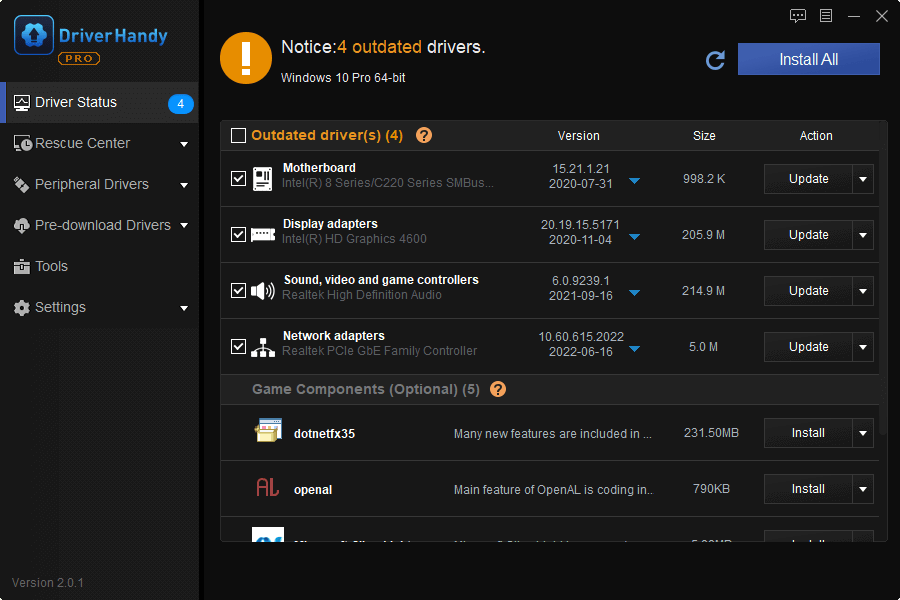
Fix 5. Check and Fix Bad Sectors
In the outcomes of the bad sectors of hard disks, you'd face the issue of the"a device which does not exist was specified" error, and you won't be able to recognize whether it occurs due to bad sectors of hard disks, so you need the EaseUS Partition Master for the surface test.
EaseUS Partition Master can recognize and discover bad sectors of your hard drive and show you with red marking so that you can easily understand bad sectors. Follow the process:
Step 1. Open EaseUS Partition Master. Go to Toolkit and select "Bad Sector Scan."
Step 2. Tick "Scan Disk" and choose the target disk from the drop-down menu.
Step 3. Click "Scan" to apply the bad sector scaning process.
Fix 6. Recreate the Partition
In the recreation results, the partition can fix your issue "a device which does not exist was specified." In this regard, again, we need the help of EaseUS Partition Master, which is an all-in-one disk partition manager and can create or recreate partitions within a few steps.
Step 1. Launch EaseUS Partition Master. To to Partition Manager, right-click on the unallocated space on your hard drive or external storage device and select "Create".
Step 2. Adjust the partition size, file system (Choose the file system based on your need), label, etc. for the new partition and click "OK" to continue.
Step 3. Click on the "Execute 1 Task(s)" button and create a new partition by clicking "Apply".
Watch the following video tutorial and learn how to create a partition in NTFS, FAT, or EXT file system.
Besides, It is a great tool that you can also use to resize partitions or delete partitions.
Fix 7. Change the Motherboard Headers
A damaged motherboard header can also cause the"a device which does not exist was specified" error. This is a little bit hard task for a non-technical person. You don't need to try on your own if you don't have any technical experience regarding computer hardware. It'd be better to take your system to a well-trained technician or repairer to change the motherboard header.
Conclusion
We walked through seven different ways to fix the issue "a device which does not exist was specified." Now we have all solutions in our hands and multiple choices, but be careful regarding changing the motherboard header because it's a technical job. Please leave it to a well-trained computer technician. You don't need to attempt it independently because you can damage your system due to mistakes and lack of technical experience and knowledge. However, according to our directions in this article, you can try six other soft methods to fix the issue.
If this issue is due to mismatching drive letters, outdated motherboard drivers, or bad sectors of hard disks, you need to try ways 3, 4, 5, and 6. EaseUS Partition Master can discover the actual problems and fix them automatically. This is a very handy tool with incredible features to fix the"a device which does not exist was specified" error.
FAQs of A Device Which Does Not Exist Was Specified
You may have any further queries regarding the issue "a device which does not exist was specified." Please find out your answers.
1. How do I resolve an error saying a device which does not exist was specified for my D drive?
You can fix that error in multiple ways. You can try to uninstall and reconnect the drive, gain permission to access the drive, change the drive letter, update the motherboard drivers, check and fix bad sectors of the hard drive, recreate the partition, etc.
2. Can a corrupted USB be fixed?
Yes, it can be fixed, and you can recover your saved files, but it's conditional. However, the good news is that 90% of USBs can be fixed. You can try through the Windows utility to check and correct the corrupted USB. But a lack of technical knowledge can be problematic for you, and your single mistake can lead to a big disaster. You can lose your saved data in a USB.
3. How do I fix Windows unable to install the unknown device?
You fix this in the "Device manager."
Step 1. Open the "Device manager," expand "Other devices" from the list, and you'll find unknown devices under "Other devices."
Step 2. Right-click on the unknown device and go to Properties > Details tab, and under the "Property" section, choose "Hardware Ids."
Step 3. Copy the value, and the following process is to download and install the correct driver after determining the device error.
Was This Page Helpful?
Cici is the junior editor of the writing team of EaseUS. She accepted the systematic training on computers at EaseUS for over one year. Now, she wrote a lot of professional articles to help people resolve the issues of hard drive corruption, computer boot errors, and disk partition problems.
Related Articles
-
How to Disable Startup Repair Windows 7 in Simple Steps [2025]
![author icon]() Alin/2025-07-04
Alin/2025-07-04 -
How to Hard Restart Mac or MacBook [2025 Update]
![author icon]() Jaden/2025-07-04
Jaden/2025-07-04 -
[2025 Guide] macOS High Sierra Download and Install
![author icon]() Brithny/2025-07-07
Brithny/2025-07-07 -
Ghost of Tsushima Director's Cut Save File Location - How to Find & Backup?
![author icon]() Jerry/2025-07-04
Jerry/2025-07-04
EaseUS Data Recovery Services
EaseUS data recovery experts have uneaqualed expertise to repair disks/systems and salvage data from all devices like RAID, HDD, SSD, USB, etc.